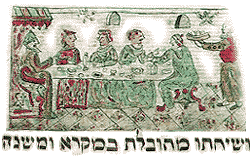
We are
all aware of the enormous contribution the British have made in recent
years to popular culture. They have given us the Spice Girls. But did
you know that Jewish culture has made a similar contribution? In fact,
an article devoted to a Yiddish writer who has captured the piquancy of
Jewish life has called Sholem Aleichem  (ha-tablan ha-gadol), "the great spice man."
(ha-tablan ha-gadol), "the great spice man."
Hebrew lovers will savor the way in which the Hebrew root for spice, (tav, vet, lamed), has added relish to the language. The first
thing we notice is that the commonly accepted word for "spice"
found both in the pages of the Talmud and on the shelves of your local
Israeli Supersol, is the result of an inadvertent error. It appears that
when some readers of the Aramaic plural
(tav, vet, lamed), has added relish to the language. The first
thing we notice is that the commonly accepted word for "spice"
found both in the pages of the Talmud and on the shelves of your local
Israeli Supersol, is the result of an inadvertent error. It appears that
when some readers of the Aramaic plural  (tevalin), spices, saw that word, they read it as a singular,
(tevalin), spices, saw that word, they read it as a singular,  (tavlin), spice. The rest is linguistic history.
(tavlin), spice. The rest is linguistic history.
Then there is the fact that two distinct words use the three letters of
our root  (tav, vet, lamed). We have
(tav, vet, lamed). We have (tevel,
accent on the first syllable), a masculine noun meaning "spice,"
and (tevel,
accent on the first syllable), a masculine noun meaning "spice,"
and (tevel, accent on the second syllable), a feminine noun meaning
"the world." The first meaning probably derives from an older,
primary root,
(tevel, accent on the second syllable), a feminine noun meaning
"the world." The first meaning probably derives from an older,
primary root, (bet, lamed, lamed), meaning "to mix." When you add spices
to food you are creating a savory mixture; alternatively, many spices
added to foods are in fact mixtures of different spices. As to the second
use, the word (tevel), world, comes from the root
(bet, lamed, lamed), meaning "to mix." When you add spices
to food you are creating a savory mixture; alternatively, many spices
added to foods are in fact mixtures of different spices. As to the second
use, the word (tevel), world, comes from the root  (yod, vet, lamed), to be fruitful, that also gives us the noun
(yod, vet, lamed), to be fruitful, that also gives us the noun
 (yevul), "produce."
(yevul), "produce."

These linguistic facts
did not stop the Rabbis from making some ingenious pluralistic plays-on-words
using both forms of our root (tav, vet, lamed). They said, for example,
(tav, vet, lamed). They said, for example,  (tevel zu eretz yisrael, she-hi metubelet ba-kol), "The world,
that is the Land of Israel, because it is “spiced” with all
[good things]." For the Rabbis, however, there was only one spice
that counted. The Talmud records their pronouncement:
(tevel zu eretz yisrael, she-hi metubelet ba-kol), "The world,
that is the Land of Israel, because it is “spiced” with all
[good things]." For the Rabbis, however, there was only one spice
that counted. The Talmud records their pronouncement:  (tavlin ehad yesh lanu, ve-shabbat shemo), "We have one spice,
and Shabbat is its name."
(tavlin ehad yesh lanu, ve-shabbat shemo), "We have one spice,
and Shabbat is its name."
This playfulness has filtered down to twentieth-century writers. Nobel
laureate S.Y. Agnon, for example, writes that the conversation of one
of his characters is  (metubelet be-mikrah u-ve-mishnah), "spiced with quotations
from the Bible and Mishnah." And Chaim Nahman Bialik reports not
too gleefully that his father would spice his words with
(metubelet be-mikrah u-ve-mishnah), "spiced with quotations
from the Bible and Mishnah." And Chaim Nahman Bialik reports not
too gleefully that his father would spice his words with (min tavlin harif), "a type of sharp spice," a real slap
in the face.
(min tavlin harif), "a type of sharp spice," a real slap
in the face.
Jewish culture has a way of confronting reality head-on, and its understanding
of our everyday needs is ever-wise. Consider the proverb  (ein tavlin ka-re-avon). "There is no better spice than hunger."
And then pass the felafel please.
(ein tavlin ka-re-avon). "There is no better spice than hunger."
And then pass the felafel please.
 |
 Dr.
Joseph Lowin is Executive Director of the National Center for the Hebrew
Language (NY). He has written extensively (in both popular and scholarly
formats) on Jewish narrative, modern Jewish literature, and Hebrew language.
His most recent book is Hebrewspeak: An Insider's Guide to the Way
Jews Think (Jason Aronson, 1995). You can visit his site at: http://www.ivrit.org Dr.
Joseph Lowin is Executive Director of the National Center for the Hebrew
Language (NY). He has written extensively (in both popular and scholarly
formats) on Jewish narrative, modern Jewish literature, and Hebrew language.
His most recent book is Hebrewspeak: An Insider's Guide to the Way
Jews Think (Jason Aronson, 1995). You can visit his site at: http://www.ivrit.org
|
 |
Other
articles related to the topic of SPICES |
HEBREW
Table of Contents
|



